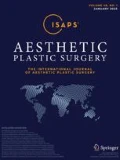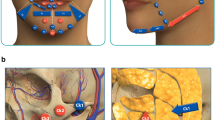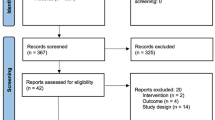Abstract
PMMA is composed of microspheres suspended in bovine collagen. Once injected in a dermal area, the carrier is absorbed, giving place to collagen that gives volume and maintains the spheres in the place. This process may give origin to exacerbate foreign body reaction and granuloma. The frequency of such complication is not clear. The primary objective was to review and compare the frequencies of granuloma between the published studies. The secondary aim was to compare the therapies and efficacies. The series of cases in which PMMA was used as facial filler were reviewed, and the rate of granulomas was compared; the case report studies describing those complications were also reviewed, and the therapies and outcomes were quantified. The data showed general frequency of PMMA-related complications of 4.9% and granulomas 1.9%; the incidence of granuloma was 1/2075 patients-year, and the time to development ranged from 6 to 180 months. The most used therapies were steroid, surgery or both, with satisfactory results. In conclusion, considering the actual risks and benefits of PMMA, we may affirm that it is a safe filler; doctors and patients must be conscious of potential risks when deciding for its use.
Level of Evidence IV
This journal requires that authors assign a level of evidence to each article. For a full description of these Evidence-Based Medicine ratings, please refer to the Table of Contents or the online Instructions to Authors www.springer.com/00266.


Similar content being viewed by others
References
Greco TM, Antunes MB, Yellin SA (2012) Injectable fillers for volume replacement in the aging face. Facial Plast Surg 28(1):8–20
Cohen SR, Berner CF, Busso M, Gleason MC, Hamilton D, Holmes RE, Romano JJ, Rullan PP, Thaler MP, Ubogy Z, Vecchione TR (2006) ArteFill: a long-lasting injectable wrinkle filler material-summary of the U.S. Food and Drug Administration trials and a progress report on 4- to 5-year outcomes. Plast Reconstr Surg 118(3 Suppl):64S–76S
Alcalay J, Alkalay R, Gat A, Yorav S (2003) Late-onset granulomatous reaction to Artecoll. Dermatol Surg 29(8):859–862
Cohen SR, Berner CF, Busso M, Clopton P, Hamilton D, Romano JJ, Rullan PP, Thaler MP, Ubogy Z, Vecchione TR (2007) Five-year safety and efficacy of a novel polymethylmethacrylate aesthetic soft tissue filler for the correction of nasolabial folds. Dermatol Surg 33(Suppl 2):S222–S230
Cohen S, Dover J, Monheit G, Narins R, Sadick N, Werschler WP, Karnik J, Smith SR (2015) Five-year safety and satisfaction study of PMMA-collagen in the correction of nasolabial folds. Dermatol Surg 41(Suppl 1):S302–S313
Salles AG, Lotierzo PH, Gemperli R, Besteiro JM, Ishida LC, Gimenez RP, Menezes J, Ferreira MC (2008) Complications after polymethylmethacrylate injections: report of 32 cases. Plast Reconstr Surg 121(5):1811–1820
Park TH, Seo SW, Kim JK, Chang CH (2012) Clinical experience with polymethylmethacrylate microsphere filler complications. Aesthet Plast Surg 36(2):421–426
Conejo-Mir JS, Sanz Guirado S, Angel Muñoz M (2006) Adverse granulomatous reaction to Artecoll treated by intralesional 5-fluorouracil and triamcinolone injections. Dermatol Surg 32(8):1079–1081
Howick J, Chalmers I, Glasziou P, Greenhalgh T, Heneghan C, Liberati A, Moschetti I, Phillips B, Thornton H (2011) Explanation of the 2011 Oxford Centre for Evidence-Based Medicine (OCEBM) Levels of Evidence (Background Document). Oxford Centre for Evidence-Based Medicine
Cohen SR, Holmes RE (2004) Artecoll: a long-lasting injectable wrinkle filler material: report of a controlled, randomized, multicenter clinical trial of 251 subjects. Plast Reconstr Surg 114(4):964–976
Bagal A, Dahiya R, Tsai V, Adamson PA (2007) Clinical experience with polymethylmethacrylate microspheres (Artecoll) for soft-tissue augmentation: a retrospective review. Arch Fac Plast Surg 9(4):275–280
Solomon P, Sklar M, Zener R (2012) Facial soft tissue augmentation with Artecoll(®): a review of eight years of clinical experience in 153 patients. Can J Plast Surg 20(1):28–32
Mani N, McLeod J, Sauder MB, Sauder DN, Bothwell MR (2013) Novel use of polymethyl methacrylate (PMMA) microspheres in the treatment of infraorbital rhytids. J Cosmet Dermatol 12(4):275–280
Lemperle G, Gauthier-Hazan N, Lemperle M (1998) PMMA-microspheres (Artecoll) for long-lasting correction of wrinkles: refinements and statistical results. Aesthet Plast Surg 22(5):356–365
Carvalho Costa IM, Salaro CP, Costa MC (2009) Polymethylmethacrylate facial implant: a successful personal experience in Brazil for more than 9 years. Dermatol Surg 35(8):1221–1227
Karnik J, Baumann L, Bruce S, Callender V, Cohen S, Grimes P, Joseph J, Shamban A, Spencer J, Tedaldi R, Werschler WP, Smith SR (2014) A double-blind, randomized, multicenter, controlled trial of suspended polymethylmethacrylate microspheres for the correction of atrophic facial acne scars. J Am Acad Dermatol 71(1):77–83
Mills DC, Camp S, Mosser S, Sayeg A, Hurwitz D, Ronel D (2013) Malar augmentation with a polymethylmethacrylate-enhanced filler: assessment of a 12-month open-label pilot study. Aesthet Surg J. 33(3):421–430
Nácul AM (2005) Contour of the lower third of the face using an intramusculary injectable implant. Aesthet Plast Surg. 29(4):222–229
Carle MV, Roe R, Novack R, Boyer DS (2014) Cosmetic facial fillers and severe vision loss. JAMA Ophthalmol 132(5):637–639
Castro AC, Collares MV, Portinho CP, Dias PC, Pinto R (2007) Extensive facial necrosis after infiltration of polymethylmethacrylate. Braz J Otorhinolaryngol 73(6):850
da Costa Miguel MC, Nonaka CF, dos Santos JN, Germano AR, de Souza LB (2009) Oral foreign body granuloma: unusual presentation of a rare adverse reaction to permanent injectable cosmetic filler. Int J Oral Maxillofac Surg 38(4):385–387
Faria KM, Fonseca FP, Silva WG, Silva RN, Vargas PA, de Almeida OP, Lopes MA, Santos-Silva AR (2014) Fine needle aspiration cytology in the diagnosis of perioral adverse reactions to cosmetic dermal fillers. Oral Surg Oral Med Oral Pathol Oral Radiol 117(5):e393–e395
Friedmann DP, Kurian A, Fitzpatrick RE (2016) Delayed granulomatous reactions to facial cosmetic injections of polymethylmethacrylate microspheres and liquid injectable silicone: a case series. J Cosmet Laser Ther 18(3):170–173
Gelfer A, Carruthers A, Carruthers J, Jang F, Bernstein SC (2007) The natural history of polymethylmethacrylate microspheres granulomas. Dermatol Surg 33(5):614–620
Hoffmann C, Schuller-Petrovic S, Soyer HP, Kerl H (1999) Adverse reactions after cosmetic lip augmentation with permanent biologically inert implant materials. J Am Acad Dermatol 40(1):100–102
Kadouch JA, Kadouch DJ, Fortuin S, van Rozelaar L, Karim RB, Hoekzema R (2013) Delayed-onset complications of facial soft tissue augmentation with permanent fillers in 85 patients. Dermatol Surg 39(10):1474–1485
Limongi RM, Tao J, Borba A, Pereira F, Pimentel AR, Akaishi P, Velasco e Cruz AA (2016) Complications and Management of Polymethylmethacrylate (PMMA) injections to the midface. Aesthet Surg J. 36(2):132–135
Lombardi T, Samson J, Plantier F, Husson C, Küffer R (2004) Orofacial granulomas after injection of cosmetic fillers. Histopathologic and clinical study of 11 cases. J Oral Pathol Med 33(2):115–120
Quirino MR, Neves AC, Campos MS, Brandão AA, Anbinder AL (2012) Oral granuloma formation after injection of cosmetic filler. J Craniomaxillofac Surg 40(7):e194–e197
Reisberger EM, Landthaler M, Wiest L, Schröder J, Stolz W (2003) Foreign body granulomas caused by polymethylmethacrylate microspheres: successful treatment with allopurinol. Arch Dermatol 139(1):17–20
Rudolph CM, Soyer HP, Schuller-Petrovic S, Kerl H (1999) Foreign body granulomas due to injectable aesthetic microimplants. Am J Surg Pathol 23(1):113–117
Ledon JA, Savas JA, Yang S, Franca K, Camacho I, Nouri K (2013) Inflammatory nodules following soft tissue filler use: a review of causative agents, pathology and treatment options. Am J Clin Dermatol 14(5):401–411
Silva MT, Curi AL (2004) Blindness and total ophthalmoplegia after aesthetic polymethylmethacrylate injection: case report. Arq Neuropsiquiatr 62(3B):873–874
Wolfram D, Tzankov A, Piza-Katzer H (2006) Surgery for foreign body reactions due to injectable fillers. Dermatology 213(4):300–304
Wu W, Chayavichitsilp P, Hata T (2012) Extremely delayed granulomatous reaction to soft-tissue injectables (polymethyl methacrylate). J Am Acad Dermatol 67(5):e206–e207
Sidwell RU, McL Johnson N, Francis N, Bunker CB (2006) Cutaneous sarcoidal granulomas developing after Artecoll facial cosmetic filler in a patient with newly diagnosed systemic sarcoidosis. Clin Exp Dermatol 31(2):208–211
Fischer J, Metzler G, Schaller M (2007) Cosmetic permanent fillers for soft tissue augmentation: a new contraindication for interferon therapies. Arch Dermatol 143(4):507–510
Al-Qattan MM (2007) Late artecoll granulomas aggravated by pregnancy. Ann Plast Surg 58(5):592
Bisschop C, Bruijn MS, Stenekes MW, Diercks GF, Hospers GA (2016) Foreign body reaction triggered by cytotoxic T lymphocyte-associated protein 4 blockade 25 years after dermal filler injection. Br J Dermatol 175(6):1351–1353
Heath CR, David J, Taylor SC (2012) Sarcoidosis: are there differences in your skin of color patients? J Am Acad Dermatol 66(1):121.e1–121.e14
Haneke E (2014) Adverse effects of fillers and their histopathology. Fac Plast Surg 30(6):599–614
Haneke E (2019) Adverse effects of fillers. Dermatol Ther. 32(2):e12676. https://doi.org/10.1111/dth.12676
Lemperle G, Morhenn V, Charrier U (2003) Human histology and persistence of various injectable filler substances for soft tissue augmentation. Aesthet Plast Surg 27(5):354–366
Ahn CS, Rao BK (2014) The life cycles and biological end pathways of dermal fillers. J Cosmet Dermatol 13(3):212–223
Fernandez-Cossio S, Castano-Oreja MT (2006) Biocompatibility of two novel dermal fillers: histological evaluation of implants of a hyaluronic acid filler and a polyacrylamide filler. Plast Reconstr Surg 117:1789–1796
Rosa SC, de Magalhães AV, de Macedo JL (2008) An experimental study of tissue reaction to polymethyl methacrylate (PMMA) microspheres (Artecoll) and dimethylsiloxane (DMS) in the mouse. Am J Dermatopathol 30(3):222–227
Vargas KF, Borghetti RL, Moure SP, Cherubini K, de Figueiredo MA (2016) Local and systemic tissue response submitted to injection of 2 and 30% polymethylmethacrylate in rats’ tongue. Gerodontology. 33(1):36–43
de Melo Carpaneda E, Carpaneda CA (2012) Adverse results with PMMA fillers. Aesthet Plast Surg. 36(4):955–963
Saylan Z (2003) Facial fillers and their complications. Aesthet Surg J. 23(3):221–224
Signorini M, Liew S, Sundaram H, De Boulle KL, Goodman GJ, Monheit G, Wu Y, Trindade de Almeida AR, Swift A, Vieira Braz A, Global aesthetics consensus: avoidance and management of complications from hyaluronic acid fillers-evidence- and opinion-based review and consensus recommendations (2016) Global aesthetics consensus: avoidance and management of complications from hyaluronic acid fillers-evidence- and opinion-based review and consensus recommendations. Plast Reconstr Surg 137(6):961e–971e
Cotofana S, Schenck TL, Trevidic P, Sykes J, Massry GG, Liew S, Graivier M, Dayan S, de Maio M, Fitzgerald R, Andrews JT, Remington BK (2015) Midface: clinical anatomy and regional approaches with injectable fillers. Plast Reconstr Surg 136(5 Suppl):219S–234S
McCracken MS, Khan JA, Wulc AE, Holds JB, Fante RG, Migliori ME, Ebroon DA, Amato MM, Silkiss RZ, Patel BC (2006) Hyaluronic acid gel (Restylane) filler for facial rhytids: lessons learned from American Society of Ophthalmic Plastic and Reconstructive Surgery member treatment of 286 patients. Ophthalmic Plast Reconstr Surg 22(3):188–191
Hatcher JL, Goldman ND (2014) Recognition and treatment of non-infectious hyaluronic acid reactions. J Dermatol Treat 25(6):513–515
Grunebaum LD, Bogdan Allemann I, Dayan S et al (2009) The risk of alar necrosis associated with dermal filler injection. Dermatol Surg 35:1635–1640
Adcock IM, Mumby S (2017) Glucocorticoids. Handb Exp Pharmacol 237:171–196
Fischer HJ, Schweingruber N, Lühder F, Reichardt HM (2013) The potential role of T cell migration and chemotaxis as targets of glucocorticoids in multiple sclerosis and experimental autoimmune encephalomyelitis. Mol Cell Endocrinol 380(1–2):99–107
Longley DB, Harkin DP, Johnston PG (2003) 5-fluorouracil: mechanisms of action and clinical strategies. Nat Rev Cancer 3(5):330–338
Bijlard E, Steltenpool S, Niessen FB (2015) Intralesional 5-fluorouracil in keloid treatment: a systematic review. Acta Derm Venereol 95(7):778–782
de Barros Silveira LK, de Oliveira FL, Alves Tde B, Rambaldi ML, de Andrade FC, Kelmer Sde C, Barbosa FC (2012) The therapeutic benefit of allopurinol in the treatment of foreign body granulomas caused by polymethylmethacrylate microspheres. Case Rep Dermatol Med 2012:945205
Tsai TF, Yeh TY (2010) Allopurinol in dermatology. Am J Clin Dermatol 11(4):225–232
Badgwell C, Rosen T (2007) Cutaneous sarcoidosis therapy updated. J Am Acad Dermatol 56(1):69–83
Breghoej A, Jemec GB (2005) Low-dose allopurinol in the treatment of cutaneous sarcoidosis: response in four of seven patients. J Dermatol Treat 16:125–127
El-Euch D, Mokni M, Trojjet S, Khouaja A, Osman AB (1999) Sarcoidosis in a child treated successfully with allopurinol. Br J Dermatol 140:1184–1185
Pfau A, Stolz W, Karrer S, Szeimies RM, Landthaler M (1998) Allopurinol in treatment of cutaneous sarcoidosis. Hautarzt 49:216–218
Nakahara T, Morimoto H, Murakami N, Furue M (2018) Mechanistic insights into topical tacrolimus for the treatment of atopic dermatitis. Pediatr Allergy Immunol 29(3):233–238
Cury Martins J, Martins C, Aoki V, Gois AF, Ishii HA, da Silva EM (2015) Topical tacrolimus for atopic dermatitis. Cochrane Database Syst Rev 7:CD009864
Caproni M, Torchia D, Antiga E et al (2007) The comparative effects of tacrolimus and hydrocortisone in adult atopic dermatitis: an immunohistochemical study. Br J Dermatol 156:312–319
Amin AR, Patel RN, Thakker GD, Lowenstein CJ, Attur MG, Abramson SB (1997) Post-transcriptional regulation of inducible nitric oxide synthase mRNA in murine macrophages by doxycycline and chemically modified tetracyclines. FEBS Lett 410:259–264
Golub LM, Ramamurthy NS, McNamara TF, Greenwald RA, Rifkin BR (1991) Tetracyclines inhibit connective tissue breakdown: new therapeutic implications for an old family of drugs. Crit Rev Oral Biol Med 2:297–321
Garrido-Mesa N, Zarzuelo A, Gálvez J (2013) Minocycline: far beyond an antibiotic. Br J Pharmacol 169(2):337–352
Humbert P, Treffel P, Chapuis JF, Buchet S, Derancourt C, Agache P (1991) The tetracyclines in dermatology. J Am Acad Dermatol 25:691–697
Sapadin AN, Fleischmajer R (2006) Tetracyclines: nonantibiotic properties and their clinical implications. J Am Acad Dermatol 54:258–265
Bachelez H, Senet P, Cadranel J, Kaoukhov A, Dubertret L (2001) The use of tetracyclines for the treatment of sarcoidosis. Arch Dermatol 137:69–73
Korting HC, Schöllmann C (2009) Current topical and systemic approaches to treatment of rosacea. J Eur Acad Dermatol Venereol 23:876–882
Marcoval J, Mana J, Moreno A et al (2001) Foreign bodies in granulomatous cutaneous lesions of patients with systemic sarcoidosis. Arch Dermatol 137:427–430
Hurst EA, Mauro T (2005) Sarcoidosis associated with pegylated interferon alfa and ribavirin treatment for chronic hepatitis C: a case report and review of the literature. Arch Dermatol 141:865–868
Mayberry J, Lee WM (2019) The revolution in treatment of hepatitis C. Med Clin N Am 103(1):43–55
Tivol EA, Borriello F, Schweitzer AN et al (1995) Loss of CTLA-4 leads to massive lymphoproliferation and fatal multiorgan tissue destruction, revealing a critical negative regulatory role of CTLA-4. Immunity 3(5):541–547
Bonney EA (2016) Immune regulation in pregnancy: a matter of perspective? Obstet Gynecol Clin North Am 43(4):679–698
Ning F, Liu H, Lash GE (2016) The role of decidual macrophages during normal and pathological pregnancy. Am J Reprod Immunol 75(3):298–309
Author information
Authors and Affiliations
Corresponding author
Ethics declarations
Conflict of interest
The authors declare that they have no conflicts of interest to disclose.
Ethical Approval
This article does not contain any studies with human participants or animals performed by any of the authors.
Informed Consent
For this type of study, informed consent is not required.
Additional information
Publisher's Note
Springer Nature remains neutral with regard to jurisdictional claims in published maps and institutional affiliations.
Rights and permissions
About this article
Cite this article
Paulucci, B.P. PMMA Safety for Facial Filling: Review of Rates of Granuloma Occurrence and Treatment Methods. Aesth Plast Surg 44, 148–159 (2020). https://doi.org/10.1007/s00266-019-01522-2
Received:
Accepted:
Published:
Issue Date:
DOI: https://doi.org/10.1007/s00266-019-01522-2




